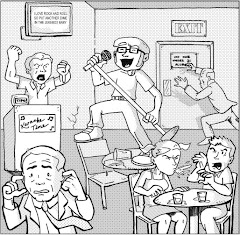Icon #1, May 1993, DC Comics/Milestone Media
Writer: Dwayne McDuffie
Penciller: M.D. Bright
Inker: Mike Gustovich
Letterer: Steve Dutro
Colorists: Racelle Menashe, James Sherman, Noelle Giddings
Writer: Dwayne McDuffie
Penciller: M.D. Bright
Inker: Mike Gustovich
Letterer: Steve Dutro
Colorists: Racelle Menashe, James Sherman, Noelle Giddings
During Black History Month, I’ve read a quite a few comic books that star icons of African-American culture: Mr. T, Black Lightning, O.J. Simpson (for better and for worse, eh?) – but I’ve have yet to read of a character that so boasted the title as, well, Icon. One part Superman, one part Cliff Huxtable, Icon is an earthbound alien refugee that has adopted the persona of a black man since 1839, and although one would assume that he might sympathize with the civil rights plight, he has earned an upper class lifestyle and believes that “those who suffer under [impoverished] conditions must have brought them upon themselves.” Despite, his invulnerability and ability to fly, as Augutus Freeman IV he has resigned himself to a rather terrestrial lifestyle . . .
Until a gang of black youth break into his home. Big screen television in hand, when the youth bump into Augustus, they assume that he’s the butler and call upon their “brotherhood” for a pass. “Ain’t no white man’s stuff worth you getting killed over,” one of the thugs asserts, but they underestimate Augustus in more ways than one. When Freeman reveals that the gang is in his home, the thug shoots him, and although Augustus drops, he surprisingly springs back up and spends the following four pages in an aerial ballet of heroism, capturing the kids and wantonly displaying his abilities in a scene that reveals how a super-powered person would really act if they didn’t have a secret identity to worry about. This sequence is rather fantastic and the only real action-oriented scene in the entire issue, but by far not the least believable . . .
Considering that, one of the kids, aspiring writer Toni Morrison, pursues Freeman at his law office and beseeches him to become a superhero, and of course she’d be his sidekick. Asserting that folks don’t need a heroic example to live by, Toni blurts, “It’s a lot easier to pull yourself up by your bootstraps, Mr. Man, if you already know how to fly!” (It’s a scrap of dialogue that must’ve impressed Icon’s creators, because they repeat it in the issue’s marketing materials, as well.) Inspired, Augustus uses Toni’s drawings and creates superhero outfits for them – a move that comes too fast considering that Freeman has been set in his earthen ways for one hundred and fifty years, but again, the creators seem eager to launch Icon’s controversial mission as a black superhero. When Icon spots a disturbance at City Hall, Toni surprisingly supposes, “You think the cops are sitting around waiting for a flying nigger to drop out of the sky and do their job for them?” Her question proves its validity when Icon does just that – drops in to lend a hand – and finds their guns turned toward him. To be continued.
While this issue was rapidly paced (an “Ultimate Icon” series would’ve dragged these twenty-seven pages into five issues worth of material, as writer Dwayne McDuffie creates enough subtext for an entire arc’s worth of narrative), some moments truly capture the spirit of the creative team’s intent to use the superhero genre to explore racial contexts. For example, in one scene, Toni quotes W.E.B. DuBois, while Augustus retorts with a preference for Booker T. Washington. The scene in Freeman’s home, contrasting high society with the lower class, reminded me of the issues presented in Eclipse’s Strike!, a parallel made more apparent when Toni dropped the “n” word. I presume that McDuffie means to present the breadth of the black experience, blending such slang with the likes of DuBois, but the dialogue seems too forced to make the impression completely effective. As a reader, the writer’s motives were more apparent to me than the characters’ dynamics – that may be what the term “preachy” means. Still, the inherent arguments didn’t overpower the iconic adventure, and in the end, we’re treated to the beginnings of a meaningful superhero epic. McDuffie always does that well.
The last few pages of this issue preview Static, Static Shock’s first ongoing series. Later this month, I intend to review an issue of Static Shock from his DC Comics relaunch, following the success of his animated series, I think. Indeed, Static is another of those black characters that has resonated with everyone, that has experienced universal success. Perhaps, in the future, when “black history” is so naturally integrated into America’s mainstream that every month is as much Black History Month as it is everyone’s, characters like Icon will get another chance, too.
One can only hope.



No comments:
Post a Comment